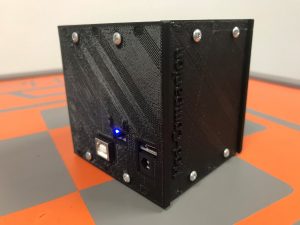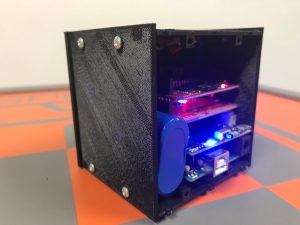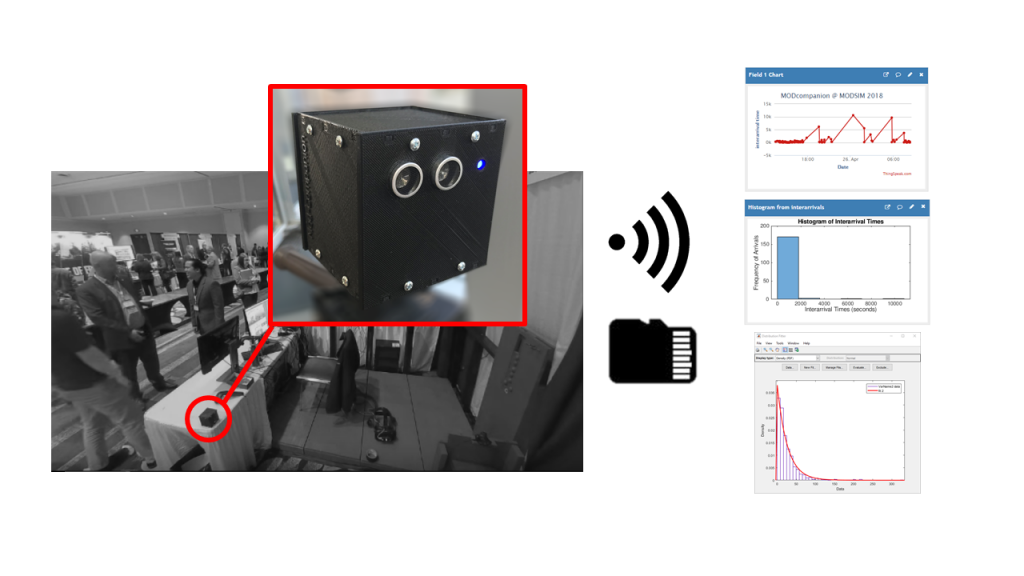We are faced with decisions and forced to make calculations on a daily basis. Which bus should I take to be on time to work? Which restaurant has the fastest service? What is the quickest route to school? When we try to answer these questions, we employ a rough version of the same tools used in every laboratory: observation, experimentation, and analysis. But what if there was a way to go beyond the lab, and take precise observations with a device that could fit in the palm of your hand?

The viaSTEM project seeks to increase access to STEM to children of all abilities by building a whole new set of tactile, audio, dynamic tools. These tools enable children to experience science through simulation by collecting data, building models, and making predictions through simulation. The viaSTEM team at CMAC and VMASC are currently building these technologies, and today are introducing the data collection device, which they call the Modeling Companion or ModCompanion.
The ModCompanion is a compact and powerful programmable tool for engaging in dynamic and experiential scientific reasoning. It automatically collects data based on the interests of its user (i.e. a participant in a viaSTEM afterschool program). “Programming” a device to gather data might seem like an intimidating task to those who are new to STEM, but ModCompanion makes it simple.

It is configured through conversation, with the ModCompanion asking about the distinct event for which it will be collecting data, as well as the start and end times. Once it’s all set up, the ModCompanion gets placed at the relevant location; then, its systems initialize and its built-in proximity sensor registers events to store them in an internal memory. It has a rechargeable battery and plenty of storage to ensure that it can be used in a variety of settings. After the data collection process is complete, the ModCompanion displays the distribution of that data collected and exports its information to the other aspects of the viaSTEM system for analysis and simulation.
For example – the ModCompanion is told to count how many people enter the cafeteria between 12PM and 1PM. The ModCompanion is then placed at the door and detects each event – that is, each time someone walks through the door – and marks it as a datapoint.
The ModCompanion is a key component to the viaSTEM program, because it gives students access to real world data that they can use to run their simulations. Students become familiar with these essential procedures of STEM learning and fieldwork by establishing parameters for their data and analyzing their findings. But before the team could use this powerful tool in the viaSTEM program, they needed to build and test it.
That’s exactly what the viaSTEM team has done. The newly designed and constructed ModCompanion was tested during the MODSIM World 2018 conference (Figure 2) to collect data on the flow of people through the Virginia Modeling Analysis and Simulation (VMASC) booth. The data collected was streamed in real-time via a wireless network to a web service with MATLAB analytics called ‘thingspeak’. It was then analyzed in real-time throughout the conference, with the results displayed live on a webpage dashboard. That dashboard could even indicate both the raw data – in this case, interarrival time information – as well as a graph called a distribution fit calculated from analyzing the raw data.

From the data extracted and analyzed, team members were able to corroborate that the highest flow of people through the VMASC booth was before the first sessions in the morning, during the long breaks between sessions, and during the lunch and dinner times. The device operated for 10-12 hours each day on battery power, and it was recharged every night.
The ModCompanion’s success indicates we are one step closer to a more dynamic and accessible educational program. It empowers its users to gain insight into the patterns that lie behind their daily lives, and to become citizen scientists.
For any inquiries or comments, please email admin@mindandculture.org.



